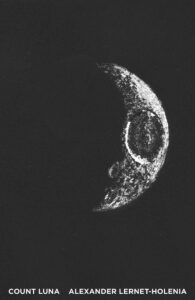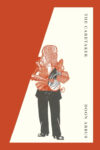
[New Directions; 2020]
Tr. from the German by Jane B. Greene
Nobody escapes the trauma and transformative power of war. Not the Austrian protagonist of Alexander Lerner-Holenia’s post-war novel Count Luna, nor its author. In narrating his family’s lineage and his own psychological tale of guilt and murder, Alexander Jessiersky makes this clear.
Jessiersky learns about the effects of nationalism and geopolitics from an early age. Growing up around a “loathsome” military father and an unhappy mother, Jessiersky “loved no one. He was one of those children who very early become aware that they exist only for themselves.” Family research doesn’t do anything to dissuade these instincts. Most of the time, his ancestors chose love over country, and in turn, those countries played a part in his ancestors’ ruin. Of course, Jessiersky’s father does the opposite and bestows narrow expectations; all actions (whether casually reading or considering a career) should contribute to furthering the empire’s cause.
Growing up in this claustrophobic environment, Jessiersky comes to see war as the antithesis of individuality, and he in turn values self-preservation and the freedoms of isolation over everything. Throughout the book, he doesn’t trust anyone with his perspective, including his wife and kids. Without tethering his psyche to anyone around him, his grasp of reality slowly drifts away, even as the tides of World War II ebb.
The turning point of the novel, when Jessiersky starts to drift away, occurs when he is approached by the Third Reich. They want some of his land. He seems not to agree with their cause, but when his default instinct to deflect kicks in, he obliges: “For what, after all, was one man’s wish to hang onto idle real estate compared with the expansion needs of a big company? With that he did not agree, returned Jessiersky. But, probably out of sheer laziness, he allowed his subordinates to do as they chose.” But there is a victim on the railroad tracks in this trolley car problem. As a result of Jessiersky’s “laziness,” Count Luna is removed from the land and sent to a concentration camp. This action triggers transformational trauma for both characters, the kind of life-altering cause and effect that eventually touches everyone they know, almost all of them innocent.
Count Luna’s life is affected in obvious ways: He is never able to live freely again. Collected and assumed dead, his perspective represents the most obviously horrifying and traumatizing aspect of WWII genocide. This book spends zero time on his perspective. Instead, it shines a spotlight on the ripple effects that traumatize those surrounding the horror. Jessiersky’s direct influence on Count Luna’s horror means he suffers waves of tormenting guilt when all he wanted to do was stay on the path of least resistance and keep the Nazis content. But during a war, bystanders can’t really abstain; can there be an innocent bystander who keeps Nazis content, and as a result, enables enslavement? Jessiersky’s inability to confront this finds him rapidly sinking into a paranoid delirium that consumes the rest of the novel.
Jessiersky’s guilt is most prominent during his visits to Count Luna’s closest relatives, the Millemoths. He confesses his role in Count Luna’s imprisonment and tells them he’s sending his suffering counterpart some care packages as penance. By the end of their conversation, Jessiersky’s irritability and victim-blaming give away his overwhelming guilt:
These were no longer human beings, so he concluded, and it made no difference whether they were no longer so through their own fault or as a result of circumstances. Probably even Luna himself, in Mauthausen, was now no longer a human being! And it seemed to Jessiersky that he had brought misfortune not upon a human creature but upon an animal that had been full of trust in human beings: by a sudden movement, he, Jessiersky, had wounded it mortally — a dumb, unsuspecting animal.
With its dual focus on the mindset of a guilty Nazi bystander and the ravaging effects of the confused guilt thereafter, the novel takes the study of the conscience that forms the basis of Eichmann in Jerusalem and mixes it with the blinding guilt of “A Tell-Tale Heart.”
Lernet-Holenia most likely related to this. He was raised by a military father, and his parents split, indicating a potentially unhappy household. Then, after starting in poetry and dabbling in dramas, he avoided making waves with the Third Reich as a screenwriter. He refused to endorse the Nazi party but he also didn’t denounce them. In fact, at one point during the war, he agreed to work at a fairly prominent Nazi site known for propaganda. Here’s how Austrian-American writer/cultural historian Robert Dassanowsky puts it: “[Lernet-Holenia’s] early actions in the Reich were confused, appearing to vacillate between naiveté and the often clumsy, often shrewd acts of a survivalist.” That certainly sounds like our Jessiersky.
Lerner-Holenia’s prose proves to be as adaptive as his “survivalist” character. There are moments of utter utilitarianism, such as this fitting listing of events that sounds like notes on a suspect: “On the morning of the seventh, he booked passage on the Aosta, which was to sail for Buenos Aires from Naples on the evening of the ninth. In the afternoon of the seventh, he visited various places of interest in the southern sections of Rome, including the Appian Way.” Boom, exposition. Then there are moments when Lernet-Holenia’s poetic instincts bubble over, just for a phrase or two, as a reminder that he was once a pupil of Rilke’s: “All around him the Alps unfolded like an ocean of petrified waves that had been lashed up by some monstrous storm.”
And he is as erratic with his subject matter as he is with his style. There are the several mentions of mazes — the novel is bookended by historical and then literal explorations of the catacombs in Rome, representing just how lost Jessiersky becomes in his quest to outsmart Luna (i.e. escape the moon). Really, the frame of this book throughout is its non-fiction asides: catacombs to start, while the Roman Empire itself comes much later. There are deep explorations into lineages, brief etymological asides, and of course, some astronomy history to provide a bit of reference material for Luna’s namesake. Oh, and there’s one page on bugs that I think delivered some metaphor I can’t remember.
There’s so much abstract detail, it may go too far in its desire to contextualize, thereby muddying Jessiersky’s delirious descent. But maybe that’s the point: It’s easy to lose the thread when you’re getting lost speculating about minutiae. And sometimes the path of least resistance means getting lost in wild speculation because following the thread only leads to more pain.
And besides, for any moments that read as intellectual indulgence, there are moments of efficient storytelling:
Jessiersky did hear, however, that the Millemoths had recovered from their fright . . . and had denounced him . . . By the time the charge was brought in, the American troops had long since turned their entire attention to the female domestic servants in the zone and other ladies of this sort. Even the American commanders were already beginning to turn their attention from the political quarrels within the country to their own extrapolitical conflicts.
Not only does this paragraph propel the plot, but it’s also an example of how Lerner-Holenia casually reinforces the book’s handling of war and its power to transform. America appears as a mighty and just liberator — until they wield that newfound righteousness with disgusting abandon. In that moment, they risk transforming from liberators to oppressors. Just like Jessiersky sheltered Count Luna until he didn’t. That’s war in this novel. Everyone stands for something, until the moment they don’t. There’s no gray area, no opting out. And either way, everyone is changed forever.
Justin Stephani is an editor and writer living in Milwaukee.
This post may contain affiliate links.







